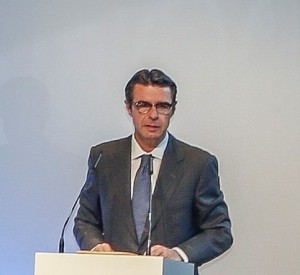These are some of the main findings of the WEC Spanish committee’s annual conference on 28 November in Madrid.
Energy issues will have a crucial role in shaping and boosting Spain’s industrial sector, economic development, and employment growth, according to José Manuel Soria, the Spanish Minister of Industry, Energy and Tourism, who made the remarks at the event.
The minister added that energy issues, such as the rise of unconventionals and climate change, are aligned with the energy-related goals in the Spanish government’s agenda. He confirmed the government’s target to limit carbon emissions in compliance with the targets set out in the EU’s 2020 climate and energy package.

The WEC Spain conference was held under the theme “Energy and global governance under transformation”. In previous years the event has provided a platform for the Spanish energy sector to discuss the international and European energy agendas and their relevance for Spain.
The most recent event analysed unconventional resources as a game changer in the rules of geostrategy as well as the multilateral climate change framework and its implications for global governance.
A global governance approach is needed to tackle climate change, according to Artur Runge-Metzger, Director of International & Climate Strategy at the European Commission. “We are halfway through two decisive decades in order to find a solution to this problem,” he said. A global governance approach would allow the design of “a framework enabling the convergence of single agendas into a universal one”, he added.
Luis Alfonso de Alba, Mexican Ambassador to Austria and Permanent Representative of Mexico to the International Organizations in Vienna, said that Europe has been working hard in the fight against climate change, and emerging economies must also do the same. “This is certainly not time to wait and see.”
Marta Camacho, Secretary General of WEC Spain, launched the findings on Spanish energy issues based on the 2013 World Energy Issues Monitor. She said the WEC’s issues mapping is a useful tool for the analysis of national energy issues. This tool, she added, could be developed so that energy issues could be compared across geographical regions.
Arturo Gonzalo Aizpiri, Chair of WEC Spain, concluded the event by stating that unconventionals and climate change were both issues with great impact and uncertainty, and they will deeply transform the future global energy scenario. As the 450ppm emissions objective will hardly be achieved on current paths, citing the WEC’s Scenarios study, he said that overcoming the lack of a global energy governance framework will be crucial in order to reach a more sustainable future. The WEC Spain event, which drew more than 300 attendees, gathered senior energy experts from the WEC and other international institutions such as the European Commission, the International Emissions Trading Association, the International Gas Union, and the United Nations Gas Centre. In addition, CEOs and top executives of the Spanish committee’s member companies were among the participants.
-
Marie-José Nadeau, Chair of the World Energy Council, spoke at the meeting in one her first public engagements in her capacity of WEC Chair. She shared with the audience the objectives of her three-year tenure.





_-80_result_688_387_s_c1_c_c.jpg)


